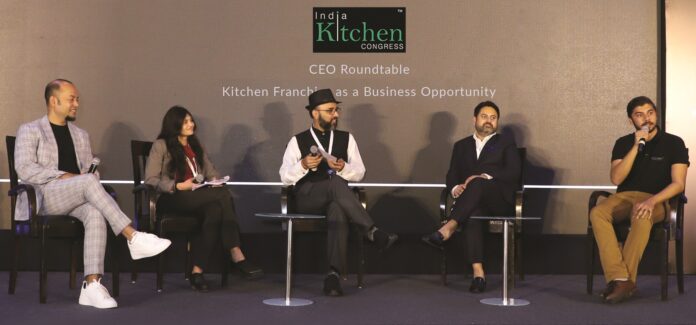Zero in on Next Business Opportunity: (L-R) Khanindra Burman, Wurfel Kuche; Hetal Iyer, Godrej Interio; Deepak Bharadia, Meine Kuche; Alok Duggal, Nolte India; Dhruv Trigunayat, Ultrafresh, are Discussing How Kitchen Industry can Take Off on the Back of Franchise Model
During a high powered discussion at India Kitchen Congress, leaders of some of India’s top kitchen companies were quizzed by one of their peers. Here’s a glimpse of what they had to say about issues relating to industry and business.
Deepak Bharadia, Meine Kuche: How can franchisers safeguard their long-term relationship with franchisees?
Khanindra Burman, Wurfel: A franchise is a two-way relationship where there are two partners. It’s not about ‘our brand’; everything belongs to both of us. I feel that the link has to be so strong that the franchisee should feel a part of the system.
Hetal Iyer, Godrej Interio: We gel very well with our franchisees. They are the entrepreneurs who help us achieve our corporate objectives, and in turn, we create value for them through training, marketing, etc. That’s what we add to the table, and together it’s a win-win combination.
Alok Duggal, Nolte India: I believe that training and investment in technology help a lot in building trust with the franchisee.
Dhruv Trigunayat, Ultrafresh: I strongly feel that the customer gets more educated and aware while dealing with the franchise. We should give the right support to the franchise so that it becomes easier to sell the branded kitchen and meet the customer’s expectation. Selling kitchens is not an easy task despite the demand.
Deepak: What could be the reasons that cause franchises to fail?
Alok: Franchises would fail if brand owners do not build an ecosystem that fosters communication between company and franchise and customer, right till after the sale has been completed. This is very important for ensuring the lead generation. And the outcome would be that the franchise would start losing interest.
Dhruv: Franchises have failed because they were not able to scale up their operations, which I must admit is not an easy task. Customers start trusting a brand only when they see many franchises coming up. Then there are bottlenecks such as lack of supporting infrastructure in the form of installers, logistics and quality construction, which create difficulty in the path of franchises.
Hetal: The kitchen business is not just about selling furniture or kitchens; it’s more of project management. Usually, the failure happens when end-to-end project management is not done correctly. That’s why we are focusing a lot on developing an end-to-end project management system, right from measurement, planning, to co-creating the kitchen with the customers.
Khanindra: I feel we need to practice ethics at all levels; at the core company level as well as at the franchise level. The kitchen business requires a lot of attention and ethical projection of behaviours.
Deepak: What is the nature of competition in India?
Hetal: It’s a very hyper-competitive market, as many Indian and foreign players are present. For the franchisees, it’s an excellent business opportunity.
Khanindra [cites Sir Henry Ford]: Take competition in a positive way and use your time to grow together, not just to fight against each other. Our industry is a very new one; there are so much scope and opportunity for all of us. More the organised market grows, better it is for the industry.
Alok: There is a vast gap between what is needed and what is being supplied. I am optimistic that the industry will not let standards fall in such a situation; otherwise, the customer will lose faith and everyone will suffer.
Dhruv: We believe in the potential of the market. There is substantial un-catered demand which we all are trying to tap. With the increasing use of software and ERP and the entry of training institutes, we believe that the formalisation of the industry has begun.
Deepak: What should the organised players do to strengthen the industry?
Khanindra: We should look beyond our brands and try to bring in standards and best policies for doing business. Collectively we should be able to suggest how franchisees should deal with their customers fairly and transparently.
Dhruv: As an industry, we should try to develop some form of accreditation policy, which would be helpful for all enterprises in this industry. It would also help in resolving disputes with customers, considering that ours is a service industry.
Alok: As an industry, in the next 5-10 years, we should emerge as one of the top employers in the country for skilled labour, designers, and logistics and warehousing services.
Also read: The 7th edition of IKC focused on innovation, partnerships, trends, and direction for the industry.


